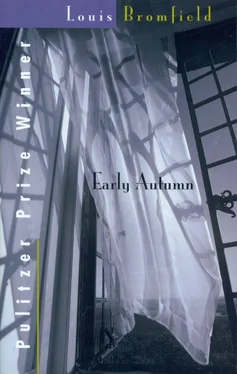It was a great box of a dwelling built by the late Mr. Struthers in the days of cupolas and gazebos on land given him by Aunt Cassie’s grandfather on the day of her wedding. Inside it was furnished with a great profusion of plush tassels and antimacassars, all kept with the neatness and rigidity of a museum. There were never any cigar ashes on the floor, nor any dust in the corners, for Aunt Cassie followed her servants about with the eye of a fussy old sergeant inspecting his barracks. Poor Miss Peavey, who grew more and more dowdy and careless as old age began to settle over her, led a life of constant peril, and was forced to build a little house near the stables to house her Pomeranians and her Siamese cats. For Aunt Cassie could not abide the thought of “the animals dirtying up the house.” Even the “retiring room” of the late Mr. Struthers had been converted since his death into a museum, spotless and purified of tobacco and whiskey, where his chair sat before his desk, turned away from it a little, as if his spirit were still seated there. On the desk lay his pipe (as he had left it) and the neat piles of paper (carefully dusted each day but otherwise undisturbed) which he had put there with his own hand on the morning they found him seated on the chair, his head fallen back a little, as if asleep. And in the center of the desk lay two handsomely bound volumes—“Cornices of Old Boston Houses” and “Walks and Talks in New England Churchyards”—which he had written in these last sad years when his life seemed slowly to fade from him … the years in which Aunt Cassie seemed rapidly to recover the wiry strength and health for which she had been famous as a girl.
The house, people said, had been built by Mr. Struthers in the expectation of a large family, but it had remained great and silent of children’s voices as a tomb since the day it was finished, for Aunt Cassie had never been strong until it was too late for her to bear him heirs.
Sabine Callendar had a whole set of theories about the house and about the married life of Aunt Cassie, but they were theories which she kept, in her way, entirely to herself, waiting and watching until she was certain of them. There was a hatred between the two women that was implacable and difficult to define, an emotion almost of savagery which concealed itself beneath polite phrases and casual observations of an acid character. They encountered each other more frequently than Aunt Cassie would have wished, for Sabine, upon her return to Durham, took up Aunt Cassie’s habit of going from house to house on foot in search of news and entertainment. They met in drawing rooms, on piazzas, and sometimes in the very dusty lanes, greeting each other with smiles and vicious looks. They had become rather like two hostile cats watching each other for days at a time, stealthily. Sabine, Aunt Cassie confided in Olivia, made her nervous.
Still, it was Aunt Cassie who had been the first caller at Brook Cottage after the arrival of Sabine. The younger woman had seen her approach, enveloped in a faint cloud of dust, from the windows of Brook Cottage, and the sight filled her with an inexpressible delight. The spare old lady had come along so briskly, almost with impatience, filled with delight (Sabine believed) at having an excuse now to trespass on O’Hara’s land and see what he had done to the old cottage. And Sabine believed, too, that she came to discover what life had done to “dear Mr. Struthers’ niece, Sabine Callendar.” She came as the Official Welcomer of the Community, with hope in her heart that she would find Sabine a returned prodigal, a wrecked woman, ravaged by time and experience, who for twenty years had ignored them all and now returned, a broken and humbled creature, hungry for kindness.
The sight set fire to a whole train of memories in Sabine … memories which penetrated deep into her childhood when with her father she had lived in the old house that once stood where O’Hara’s new one raised its bright chimneys; memories of days when she had run off by herself to play in the tangled orchard grass among the bleeding hearts and irises that surrounded this same Brook Cottage where she stood watching the approach of Aunt Cassie. Only, in those days Brook Cottage had been a ruin of a place, with empty windows and sagging doors, ghostly and half-hidden by a shaggy tangle of lilacs and syringas, and now it stood glistening with new paint, the lilacs all neatly clipped and pruned.
There was something in the sight of the old woman’s nervous, active figure that struck deep down into a past which Sabine, with the passing of years, had almost succeeded in forgetting; and now it all came back again, sharply and with a kind of stabbing pain, so that she had a sudden odd feeling of having become a little girl again … plain, red-haired, freckled and timid, who stood in terror of Aunt Cassie and was always being pulled here and there by a thousand aunts and uncles and cousins because she would not be turned into their idea of what a nice little girl ought to be. It was as if the whole past were concentrated in the black figure of the old lady who had been the ringleader, the viceroy, of all a far-flung tribe, an old woman who had been old even twenty years earlier, lying always on a sofa under a shawl, issuing her edicts, pouring out her ample sympathies, her bitter criticisms. And here she was, approaching briskly, as if the death of Mr. Struthers had somehow released her from bonds which had chafed for too long.
Watching her, one incident after another flashed through the quick, hard brain of Sabine, all recreated with a swift, astounding clarity—the day when she had run off to escape into the world and been found by old John Pentland hiding in the thicket of white birches happily eating blueberries. (She could see his countenance now, stern with its disapproval of such wild behavior, but softening, too, at the sight of the grubby, freckled plain face stained with blueberry juice.) And the return of the captive, when she was surrounded by aunts who dressed her in a clean frock and forced her to sit in the funereal spare bedroom with a New Testament on her knees until she “felt that she could come out and behave like a nice, well-brought-up little girl.” She could see the aunts pulling and fussing at her and saying, “What a shame she didn’t take after her mother in looks!” and, “She’ll have a hard time with such plain, straight red hair.”
And there was, too, the memory of that day when Anson Pentland, a timid, spiritless little Lord Fauntleroy of a boy, fell into the river and would have been drowned save for his cousin Sabine, who dragged him out, screaming and drenched, only to receive for herself all the scolding for having led him into mischief. And the times when she had been punished for having asked frank and simple questions which she ought not to have asked.
It was difficult to remember any happiness until the day when her father died and she was sent to New York, a girl of twenty, knowing very little of anything and nothing whatever of such things as love and marriage, to live with an uncle in a tall narrow house on Murray Hill. It was on that day (she saw it now with a devastating clarity as she stood watching the approach of Aunt Cassie) that her life had really begun. Until then her existence had been only a confused and tormented affair in which there was very little happiness. It was only later that reality had come to her, painfully, even tragically, in a whole procession of events which had made her slowly into this hard, worldly, cynical woman who found herself, without quite knowing why, back in a world she hated, standing at the window of Brook Cottage, a woman tormented by an immense and acutely living curiosity about people and the strange tangles which their lives sometimes assumed.
She had been standing by the window thinking back into the past with such a fierce intensity that she quite forgot the approach of Aunt Cassie and started suddenly at the sound of the curious, familiar thin voice, amazingly unchanged, calling from the hallway, “Sabine! Sabine dear! It’s your Aunt Cassie! Where are you?” as if she had never left Durham at all, as if nothing had changed in twenty years.
Читать дальше












